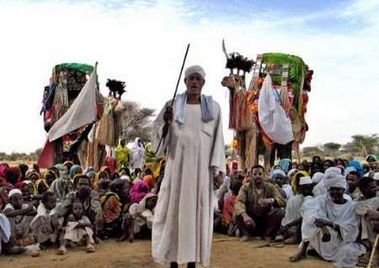Ex-Janjaweed leader accuses North Darfur governor of fuelling tribal conflicts
August 27, 2014 (KHARTOUM) – The Sudanese Awakening Revolutionary Council (SARC), led by Darfurian Arab Mahameed clan chief Musa Hilal, has renewed accusations against the governor of North Darfur state, Osman Mohamed Youssef Kibir, of fuelling tribal conflict between Beni Hussein and Rizeigat (Aballa) tribes in Al-Seraif locality.

The official spokesperson of the SARC, Ahmed Mohamed Abbakar, on Wednesday told Sudan Tribune that Kibir opposes any reconciliation efforts carried out by Hilal to end tribal clashes, saying that Tigi incident was intended to abort the agreement reached last year between the two tribes in Al-Seraif locality under the auspices of Hilal.
The relationship between Kibir and Hilal has been strained since last year following clashes which erupted between members of the two tribes in Jebel Amer area over control of the region’s gold mines.
Hilal continued to demand the central government to sack Kibir from his position but in recent statements he was quoted as saying “there is no personal feud between me and Kibir”.
Earlier this year, Hilal’s troops seized control of western localities in North Darfur state including Saraf Omra, Kutum, Kabkabiya, Al-Seraif, and El Waha.
The tribal chief announced the establishment of administrations in these localities, naming his forces the SARC.
The SARC carried out several attacks on government forces in North Darfur, the last of which was against the Central Reserves Forces (CRF) which were heading towards Kabkabiya, leading to the death and injury of 100 people, as well as the confiscation of 10 vehicles from Kabkabiya locality.
Earlier this month, Kibir sent a delegation headed by presidential commissioner Al-Tigani Senin to meet with Hilal and resolve the disputes, but the latter put several conditions on her top cancellation of the parallel local administrations established by Kibir inside Mahameed clan and compensation of those who lost money in the Ponzi scheme known as Mawasir market.
Hilal accuses Kibir of establishing parallel local administrations inside his clan in order to weaken his control over his tribesmen.
Identical sources told Sudan Tribune that Hilal sent a message to the presidency last week demanding relieving him of his position at the Sudan Federal Government Chambers (SFGC) besides sacking Kibir as gesture to end the tension in North Darfur state.
Last month, SARC signed a memorandum of understanding (MOU) with the rebel Sudanese People’s Liberation Movement-North (SPLM-N) to end the totalitarian regime and establish the democratic alternative.
On 9 August, the Arab Mahameed clan held a general meeting in Aamo area in the locality of Kutum and inaugurated Hilal as its chief.
The tribal chief stands accused by many human rights groups of leading a terror campaign against the African tribes Sudan’s western region of Darfur.
But he has denied any wrongdoing and told Human Rights Watch (HRW) in a videotaped interview in 2005, that he only recruited militias on behalf of Sudan’s central government.
The Darfur conflict began in 2003 when an ethnic minority rose up against the Arab-dominated government in Khartoum, which then was accused of enlisting the Janjaweed militia group to help crush the rebellion.
The United Nations Security Council (UNSC) imposed travel and financial sanctions on Hilal and three other individuals in April 2006. However, unlike other individuals, including Sudanese president, Omer Hassan al-Bashir, he is not wanted by the International Criminal Court (ICC).
(ST)
